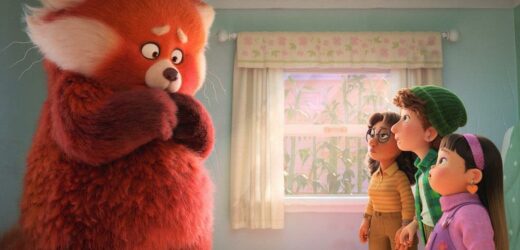Puberty is a monster — or more aptly, an adorable, uncontrollable giant panda — in Pixar’s “Turning Red.” An Oscar winner for her imaginative smothering-mother short “Bao,” helmer Domee Shi makes a worthy addition to the boys-club studio’s relatively small circle of feature directors, exploring another complicated Asian American (technically, Chinese-Canadian) parent-child dynamic, this time between a perfectionist tiger mom and the high-achieving yet deeply repressed teenage daughter who’s dying to let out her inner freak just a little.
For decades, boys could look to werewolves and the Incredible Hulk as colorful metaphors for mood swings and aggro outbursts, while girls have had considerably fewer models to draw on for the changes they face in adolescence — which is where Shi’s perky puberty allegory proves such a welcome innovation. One morning, after the most humiliating incident of her young life, 13-year-old Meilin Lee (voiced by Rosalie Chiang) wakes up as a giant red panda — the reddish-brown, ringtail fox-like cousin of Beijing’s black-and-white Olympic mascot, rendered here as a big, cutesy-wootsy teddy bear.
Turns out, Mei triggered a magic spell that’s been passed down through female members of her family for generations, and which proves more than a little inconvenient in early-aughts Toronto. Mei’s typically attentive mom, Ming (Sandra Oh), is surprisingly slow to recognize what her daughter’s going through, mistaking Mei’s predicament for her first period. How many animated films can you name that deal with that taboo subject?
But Shi’s just getting started, as far as Pixar firsts are concerned. A decade ago, the studio booted director Brenda Chapman off “Brave,” which makes “Turning Red” — its 25th full-length toon and third direct-to-Disney Plus release — the only one to be fully overseen by a woman. And though Pixar previously let Pete Sohn (another of its shorts-trained helmers) graduate to directing “The Good Dinosaur,” this is the first of the company’s features to center the Asian experience.
Pixar can be slow to broaden its cultural horizons, but when it does, the results feel sincere, as in “Coco” or “Soul.” What’s most satisfying about “Turning Red” is the degree to which Shi gets to share so many aspects of her upbringing — based not on field trips to a foreign country, à la “Ratatouille” and “Up,” but on the cuisine and customs of its lead creator. The fact that said storyteller is a woman makes a world of difference, as Shi channels her insecure adolescent self into the film’s upbeat and relatable protagonist, embarrassing boy-band obsession and all. (She pushes the Pixar house style, incorporating signature anime touches in the characters’ exaggerated facial expressions and dynamic pose-to-pose blocking.)
Mei represents the kind of obedient “honor your parents” first-generation immigrant whose life choices are shaped by distant college plans. She loves math, aces every test and is overloaded with extracurricular activities, leaving hardly any free time for her three best friends: dependable rebel Miriam (Ava Morse), no-filter spaz Abby (Hyein Park) and possibly queer-coded Priya (Maitreyi Ramakrishnan). As a result, Mei’s constantly apologizing to her buddies for ditching them to help out at the family shrine, where red pandas serve as a spirit animal of sorts.
But that’s before she actually becomes a panda herself. The change is startling at first, but reversible. Once Mei calms down, she reverts back to her old self. But every time her emotions spike, she “pandas” again: A fluffy tail and ears might sprout, or else her whole body will switch with an appealing “poof.” There may be shades of Dr. Jekyll and Mr. Hyde in “Turning Red,” but Shi keeps the entire affair feeling light, holding back until very late in the game about the reason Ming is so worried. To Mei and her friends (and audiences too), “panda-ing” is a blast. But as far as her mom is concerned, Mei needs to follow a ritual on the next red moon to permanently rid herself of the curse.
Evidently, “curing” Mei is a pretty easy thing to do — as is managing the transformations, once she discovers the trick to switching back — which is perhaps the first clue that the character, who’s discovering dimensions of herself she never knew existed, may not want to go through with banishing her ungainly alter ego. (If this were the right choice, the movie would have made it harder.) What does the red panda represent exactly? Well, you could read it as any number of things. Mei describes it as the “messy part” of her personality, though it stands for anything about you that your parents tried to suppress but that really deserves to see the light of day.
That seemingly benign “embrace your inner weirdo” lesson places “Turning Red” squarely within a patronizing new cartoon trend, in which grown-ups are depicted as ignorant and desperately in need of a lesson only their children can provide. In the past year alone, “Luca,” “Encanto” and “The Mitchells vs. the Machines” all insisted that moppets know better than their parents. Now Pixar’s panda fantasy delivers another pandering message, insisting that still-immature Mei is fine as she is and her mom is the one who needs to change. That’s not wrong, necessarily, though such movies peddle empowerment at the expense of humility. Whatever happened to respecting one’s elders?
Such old-fogey objections aside, “Turning Red” represents a fresh change from traditional Pixar fare, eschewing the slightly fuddy-duddy nostalgia of “Toy Story” and “Cars” for a this-side-of-Y2K millennial mindset. The kids have cellphones and Tamagotchi-style virtual pets, and the thing Mei and her friends want most in the world is to see a boy band called 4*Town in concert. These five heartthrobs are presented as a joke, but their insidiously catchy single “Nobody Like U” — written by Billie Eilish and big brother Finneas O’Connell to sync with classic ’N Sync hits — will surely worm itself into your brain.
So will Shi and co-writer Julia Cho’s more serious ideas. Irresistibly cute and thoroughly unashamed of its own silliness, “Turning Red” may be second-tier Pixar, but the emotions run every bit as deep as in the studio’s best. Consider the magical scene in which Mei meets her mother as a young girl and gets to hear what pushy parents so rarely tell their children — perhaps the most resonant expression of long-withheld approval since the beauty parlor scene in “The Joy Luck Club,” when Tsai Chin’s character assures her daughter, “Now you make me happy.” Between this film and “Bao,” Shi has a gift for hatching allegories that translate well to animation. By unleashing her inner panda, she’s given girls everywhere inspiration to do the same.
Source: Read Full Article


